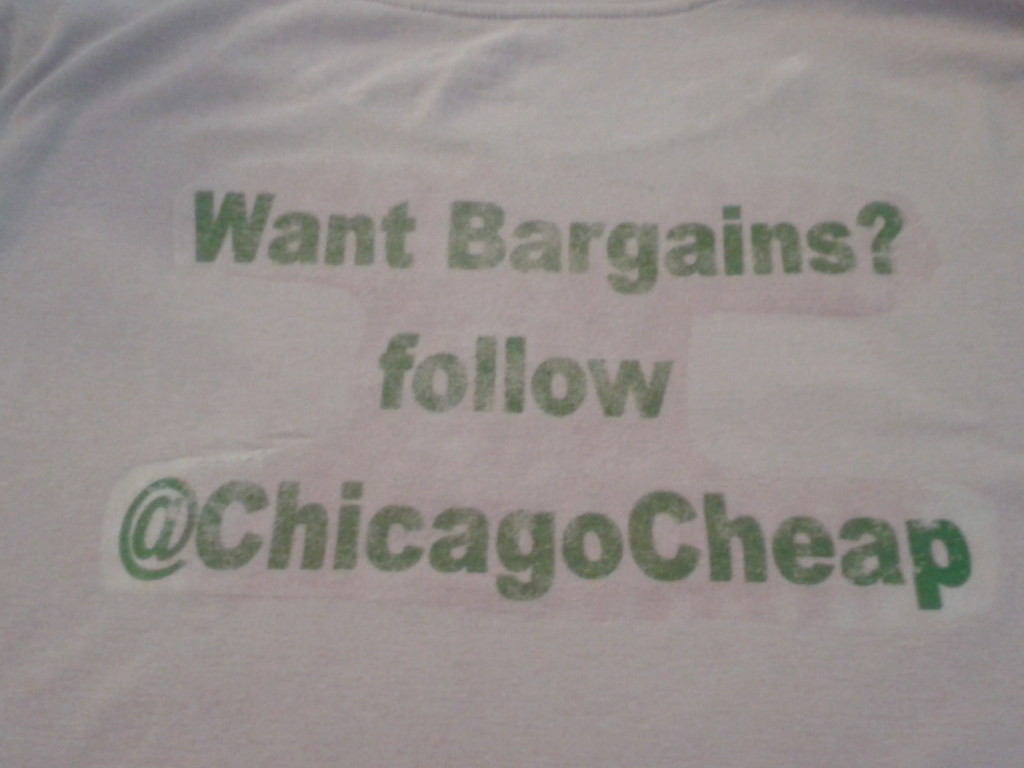 The picture is a slice of (poorly done) DIY culture, a shirt I made to help promote Chicago on the Cheap. In recent years, my business has shifted toward blogging and away from writing for publications.
The picture is a slice of (poorly done) DIY culture, a shirt I made to help promote Chicago on the Cheap. In recent years, my business has shifted toward blogging and away from writing for publications.
Back in 1997, Dan Pink published an article in Fast Company called “Free Agent Nation“. It was later expanded into a book. I was on maternity leave at the time, trying to decide what to do next. And at this time, the broader world was awash in start-up companies and new technologies, like the commercial Internet, that made it easier for people to work remotely. Office equipment was shrinking in size and cost – anyone could have a printer, scanner, or fax machine! The whole idea of working for yourself, at home, was new – and in a booming economy, it was plausible. I had no trouble finding clients because there was more than enough work to do in San Francisco in 1998.
Now, self-employment is huge and common, but for different reasons – the lack of traditional employment opportunities and start-up capital. It’s easy to start a blog, and it is also much more difficult to make a living writing for traditional publications than it used to be. Etsy makes it easy to sell handmade clothes, jewelry, toys, and household items, helping people make money from handicrafts in an era where manufacturing has moved to Asia. Food trucks make it easy for people to test recipes, research markets, and run a small business in a field with a notorious failure rate.
This week, I found out about a service in Chicago that offers free walking tours of the Loop (although satisfied customers are encouraged to tip.) It’s an interesting business model, with low overhead and potential for a good hourly rate.
All these small, do-it-yourself businesses allow people to make a living while doing what they love. But there is a gray cloud around that silver lining. Proprietors face a lot of risks. They have a hard time getting health insurance (although that will change soon, it is hoped), they face exposure to such nuisances as libel lawsuits, and they need to organize their own retirement plans.
On a macroeconomic basis, the low economies of scale in this blogger/Etsy/food truck world may lead to flat or shrinking economic growth. It’s a change in the nature of productivity. Historically, increased productivity has led to growth in output, which in turn has led to improvements in well being. That’s the story of economic growth. Now, economic growth may not be related to happiness, satisfaction, and family stability, at least once people are well up on Maslow’s hierarchy of needs. (There is no nobility in grinding poverty.) I don’t make as much money as I did when I worked for investment banks. I also took three hours off this afternoon to take my kid to lunch and to shop for school supplies. Would any boss in America allow that?
In college, I worked for one of my professors, Robert J. Gordon. His area of expertise is macroeconomic growth, especially relationships between inflation and unemployment in industrialized nations. In recent years, he’s expanded his work to look at the technological drivers of growth, and he’s concluded that maybe, the Industrial Revolution was a fluke. Maybe, there is nothing new on the horizon to push GDP to new heights.
Needless to say, this view is controversial. It’s hard to accept that the U.S., or the world at large, won’t be growing onward and upward. Also, some newer technological developments have increased economic growth, but at the expense of employment – think of software that allows computers to do document searches that once would have been handled by entry-level employees. That leads to growth at the expense of overall societal ease. The U.K. has added a measure of national well-being to its national statistics, separating economic growth from everything else.
The greatest economic risk to the new ways of working come from the lack of retirement security. When you run your own business, it is hard to save money because your income is so irregular. I can’t pay myself first if I also have to make an estimated tax payment, pay legal fees, or attend a conference out of a given check. If incomes go down, people will have even less money to set aside; if economic growth slows or reverses, the investment returns will fall. Even a disciplined person with a good income will have trouble saving for retirement in a world of 1% interest rates.



This is great information. Thank you for publishing this.